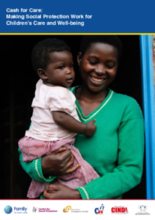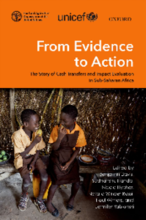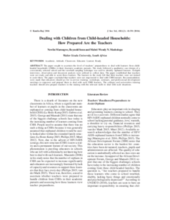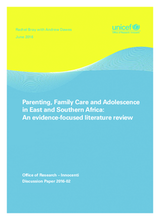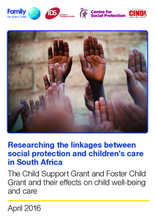childrens_living_arrangement
children_living_without_bio
Displaying 231 - 240 of 336
Family for Every Child, in partnership with the Centre for Social Protection at the Institute for Development Studies, just announced the launch of its Cash for Care: Making Social Protection Work for Children’s Care and Well-being Report.
The International AIDS Conference is the premier gathering for those working in the field of HIV, as well as policy makers, persons living with HIV and other individuals committed to ending the pandemic. It is a chance to assess where we are, evaluate recent scientific developments and lessons learnt, and collectively chart a course forward.
This book published jointly by FAO, UNICEF, and Oxford University Press presents the findings from evaluations of the Transfer Project, a cash transfer project undertaken in the following sub-Saharan African countries: Ethiopia, Ghana, Kenya, Lesotho, Malawi, South Africa, Zambia, and Zimbabwe. It concludes that cash transfers are becoming a key means for social protection in developing countries.
This paper is the investigation of the level of teachers’ preparedness and their ability to deal with learners from child headed households (CHHs) in their (learners) academic pursuits.
This study analyzes the experiences of adolescents living with HIV or AIDS.
This report captures what has been accomplished in social service workforce strengthening in eight countries in Sub-Saharan Africa and highlights areas for future intervention. Progress made to strengthen the social service workforce within these countries is useful when reflecting on global trends and ways forward.
This paper examines existing knowledge on raising adolescents in east and southern African countries, including Kenya, Malawi, Mozambique, South Africa, Tanzania and Zimbabwe. According to the report, and within the context of these regions, parenting is understood to be handled through extended community and family networks.
This document is a report on a study which involved a survey of all foreign-born children placed in child and youth care centers across South Africa’s Western Cape Province. The study examines the intersection between migration law and children’s rights.
In this piece for the South African Sunday Times, Deborah Minors writes about her father’s experience of discovering he was adopted and her research on men’s feelings regarding adoption. The article also features stories of other male adoptees and adoptive parents in South Africa, focusing on their attitudes and reactions towards adoption.
This report presents research on the impact of two cash transfer programs for vulnerable children in South Africa on children’s care.

